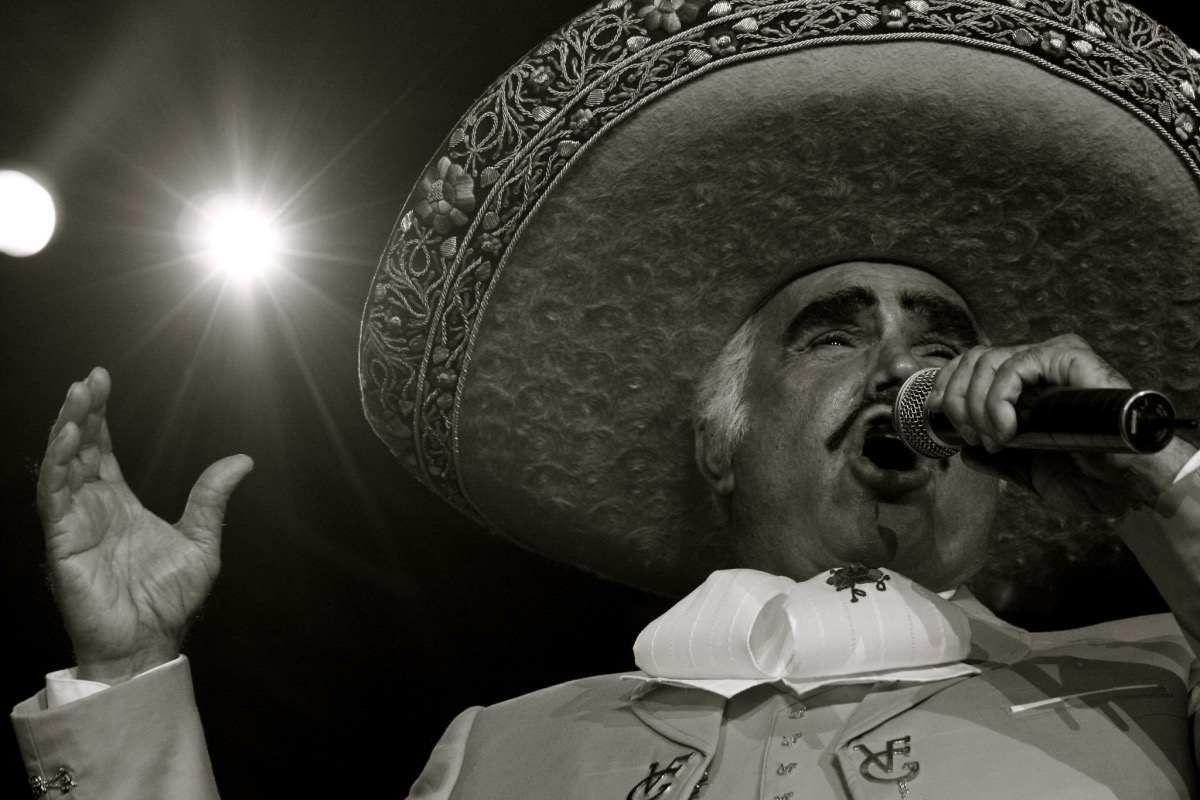NEW YORK — On Monday night, dozens of people gathered on the ruby-red TKTS steps at the center of Times Square, waiting for a mariachi band that was scheduled to arrive at 6 p.m. Attendees waved Mexican flags and cheered each other in anticipation. When, at 6:30, the band still hadn’t arrived, the crowd took it upon themselves to celebrate without them. People of all ages gathered in a circle and sang classic mariachi songs in homage to the late Mexican singer Vicente Fernández, who died on Sunday at a hospital in Jalisco, Mexico at the age of 81 after being hospitalized for a serious fall.
https://www.instagram.com/tv/CXjQ39iJ1Kb/?utm_medium=copy_link
Also known as “Chente” and “El Rey” by fans, his singing career spanned decades, beginning in the 1970s. Tributes have sprung up around the country, and celebrities have expressed their condolences. Mexico President Andrés Manuel López Obrador tweeted about Chente, “symbol of the ranchera song of our time, known and recognized in Mexico and abroad.”
Transmito mi pésame a familiares, amigos y millones de admiradores de Vicente Fernández, símbolo de la canción ranchera de nuestro tiempo, conocido y reconocido en México y en el extranjero.
— Andrés Manuel (@lopezobrador_) December 12, 2021
The legend of all legends. You will be missed but never forgotten. Que disfrutes en los cielos y de un Tequilasoooo de Rey a Rey. Dale Maestro! #chentesiguesiendoelrey #VicenteFernandez pic.twitter.com/IJHZTrwofJ
— Pitbull (@pitbull) December 12, 2021
Today we lost someone who was with us when we celebrated life and when we felt like life was over. Vicente Fernandez “El Rey” will be loved, missed and celebrated forever! Thank you for the impact you made on my life. pic.twitter.com/juiEAaVOSx
— G a b r i e l – I g l e s i a s (@fluffyguy) December 12, 2021
Chente made a place for himself in the genre of marichi music through his powerful renditions of the classics, with a discography of over 100 records. He appeared in more than 30 films, the most well know being Tacos Al Carbón (1971), La Ley del Monte (1976), and Por Tu Maldito Amor (1990). In them he plays heroic characters who defend the poor, fight for the honor of himself and others, and protect others from harm. He embodied the cultural values of Mexico: toughness and a strong will. He came from a blue-collar family and rose through the ranks, and the characters he played in movies mostly mirrored his working-class background. His roots and the persona he played in movies made him a relatable figure—Mexicans saw themselves in him.
Para el archivo.
El Dodger Stadium cantando “Volver, Volver”!! ????? #Postseason #Dodgers pic.twitter.com/6jceWTt5PN— Laura ?? (@lauravettelista) October 22, 2021
In the midst of the crowd in Times Square on Monday stood a five-foot cross with Chente’s portrait wrapped in red, green, and white ribbons—the colors of the Mexican flag. The names of different countries in Latin America were shouted out, and immigrants from Colombia, Brazil, and Peru raised their hands to introduce themselves. They took turns encouraging each other to lead the group and sing. The comaderie on this night was not only a celebration of Chente’s legacy, but a celebration of Latinx heritage.
As a child back home in Morelos, I watched Chente movies with my grandparents and extended family; it was a custom my parents brought with us to this country. My grandparents recently passed away, and for me Chente holds memories of the time spent with them. Combined with mariachi music, banda, and corridos, it was a source of comfort, reminding us that we could find a home far away from where we were born.
For immigrant Mexicans, Chente is not only a cultural symbol, he is a symbol of perseverance for those of us who left to start anew. “There aren’t people who represent our culture at that level anymore,” Carmen Hernández Rivera, a Mexican immigrant, tells me in Spanish. “His voice was unique and his simplicity as a person is missing from the new generations.”
Chente’s character, his legacy, will forever be about showing endurance in the face of difficulty.
Long live El Rey.
***
Yesica Balderrama is a journalist and writer based in New York City. Her work has appeared on WNYC, NPR, Latino USA, PEN America, Mental Floss, and others. Twitter: @yesica_bald



